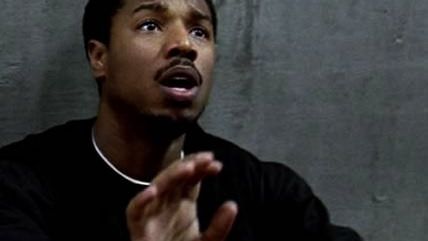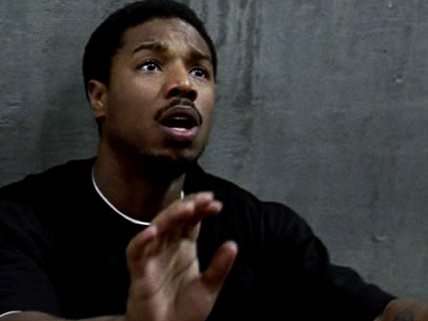Fruitvale Station
Michael B. Jordan offers a complex portrayal of Oscar Grant, who was killed by police.


Fruitvale Station, the directorial debut of Ryan Coogler, chronicles the last day of Oakland resident Oscar Grant, the 22-year-old who was shot in the back after he was laid face down on the concrete platform of BART's Fruitvale station early New Year's Day morning in 2009. Grant's death led to weeks of protests against police brutality and racism in the Bay area. Coogler, an Oakland native, was a graduate cinema student at USC at the time of the Grant shooting. He wanted to make a movie about Grant to, in his own words, get the "audience to get to know the guy."
In choosing, however, to focus on the last 24 hours of Oscar Grant's life, Coogler made it impossible for the audience to "get to know the guy." While Coogler used court documents and interviews with friends and family to inform his work, the narrative in Fruitvale Station is a dramatization. A scene where Grant witnesses the death by hit and run of a dog, for example, is completely fabricated, and it's difficult to tell whether other parts of the narrative are true to what happened, or merely true to what Grant's friends and family say or believe happened. To Coogler's credit, despite this, Michael B. Jordan's performance as Oscar Grant does not come off as artificially sympathetic. Grant is presented as a complex character, a man who seems generally to want to do good but who has obvious character flaws. Early on in the film, Grant is outed by his girlfriend (and mother of his child) as a philanderer, and on several occasions serious anger management issues are evident. Grant was a troubled person, and Coogler doesn't shy away from that.
Perhaps more importantly, Grant is shown to be someone who was already a victim of state violence before he was ever shot on a subway platform. While the film takes place in the last 24 hours of Grant's life, there's an important flashback. Grant has lost his job a few weeks before the events in the film, but has not yet told his girlfriend. He goes down to the coast to sell an ounce of marijuana to an acquaintance. He decides not to, dumping the weed into the ocean as he reflects on his last time in prison: when his mother, visiting him behind bars, tells him his daughter asked why he loved "going on vacation" (the excuse given to her for Grant's involuntary absence) more than he loved her. It's a powerful moment, and certainly illustrates why Grant makes the decision to dump several hundred dollars' worth of marijuana instead of selling it when he has serious money problems. Losing his job at the fish market jeopardized his ability to care for his daughter and her mother, but selling drugs would also, by potentially sending him to jail, jeopardize his relationship with his child. But there is nothing natural about the latter danger; it is a product of an unjust law.
The real-life Grant spent two stints in prison, both drug-related. In that way, Grant was a victim of state violence before he ever stepped on the BART train car (which, incidentally, appears throughout the film, almost as a character of its own, a kind of harbinger of death).
The most disruptive characters in the movie are the police officers. They appear at Fruitvale station after a minor scuffle on the train involving Grant, his friends, and another group that gets away. By the time the cops arrive, the fight has already broken up on its own; the police begin immediately to demand respect for their authority. It is clear to the audience and to the passengers on the stopped train that at this point the police, not Grant or anyone else in the area, are the ones disturbing the peace. Grant knows his rights, repeatedly pulling out a cellphone to record the cops while they detain him and his friends. An off-hand comment he makes about the cops not having the power to arrest them because he and his friends did nothing wrong sends the police officers off the rails. It is perhaps the most realistic moment in the film; anyone who's dealt with cops long enough has seen that kind of behavior. And, indeed, one of the real-life cops involved in the incident admitted afterward that Grant and his friends would have been let off with merely a citation if they had complied—cop-speak for not asserting your constitutionally protected rights.
Instead, one of the cops decides he's had enough of Grant, who at this point they've already gotten face down on the ground. Instead of putting the handcuffs on him, he steps back to tase him into compliance. But the cop pulls out his firearm instead, shooting Grant in the back. The bullet ricochets off the floor and punctures one of Grant's lungs. Then the handcuffs went on. Eight hours later he is dead.
The encounter was completely unnecessary. No one at the station had expressed any desire to press charges against Grant. No one had claimed he assaulted them. He offended the police, and that cost him his life.
Incidents like Oscar Grant's may not make it into the news cycle often, but what's frightening about the film is that every part of Grant's encounter with police—their demands to have their authority respected, their casual brutality, their intolerance of someone exercising his constitutional rights, their excessive reliance on the use of force—happens somewhere in America each day.


Show Comments (17)